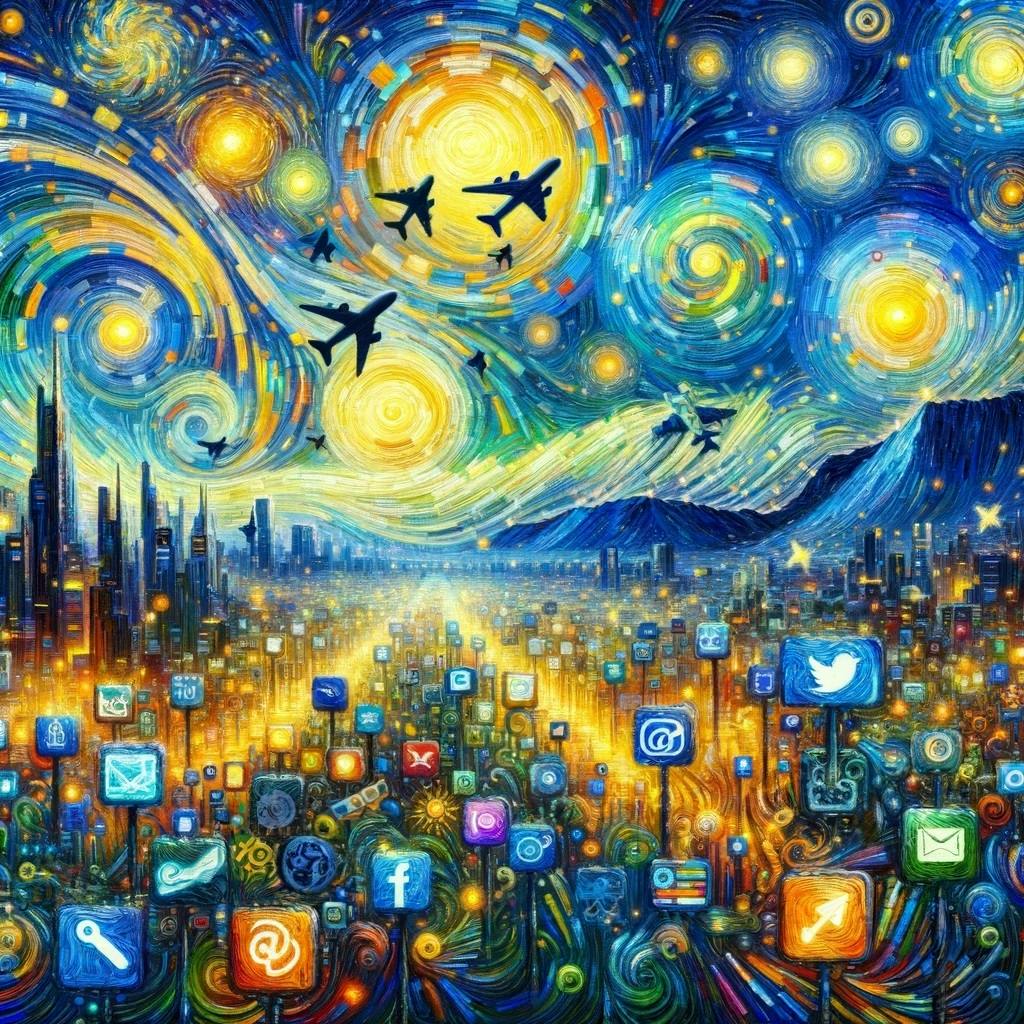Remember that feeling? The thrill of stepping off a plane into a new city, the scent of unfamiliar spices at a bustling market, or the quiet wonder of a breathtaking natural landmark. The COVID-19 pandemic may have stolen those moments from us, but it couldn't extinguish the deep-rooted human desire to explore.
The Impact of COVID-19: The travel and tourism industry faced unprecedented challenges during the pandemic. From grounded airplanes to deserted hotels, the impact was devastating. But with vaccinations on the rise and restrictions easing, travelers are eager to pack their bags again.
The Rise of Travel in 2022 and Beyond Recent travel statistics show a significant rebound in 2022, setting the stage for robust growth in the years to come. With a renewed zest for adventure, travelers are seeking out destinations and experiences that ignite their wanderlust. For tourism and travel businesses everywhere, this means digital marketing is no longer a luxury – it's the key to unlocking a wave of eager potential customers.
Social Media Contests – Fueling Engagement and Excitement
Social media contests are a fantastic way to generate buzz around your destination or tourism business. They offer an element of fun and tap into people's love of winning prizes. But remember, not all contests are created equal! Here's how to make yours stand out:
- The Prize: Choose a prize that resonates with your target audience. Think about experiences, exclusive offers, or travel-related items that are both appealing and relevant to your brand.
- The Mechanics: Keep the entry process simple. Don't ask for too much information or require overly complicated actions. Some popular contest ideas:
- Photo/Video Contests: Ask people to share their favorite travel memories featuring your destination, or capture themselves experiencing a specific attraction or activity.
- Caption Contests: Show a compelling image and ask people to submit creative or funny captions.
- "Tag a Friend" Contests: Encourage sharing and increase reach by asking participants to tag a friend they'd like to bring on their dream trip.
- Promotion: Don't just post your contest and hope for the best. Promote it actively through your social channels, and email newsletters, and even consider targeted paid ads.
Example: A beach resort could run a photo contest asking people to share their best "beach vacation moments" for a chance to win a week-long stay.
Key Takeaway: Done well, social media contests can boost your brand visibility, foster a sense of community, and provide valuable user-generated content that you can repurpose in your digital marketing strategy.
Quizzes and Scavenger Hunts - Adding a Touch of Adventure
Quizzes and scavenger hunts tap into the human desire for playful engagement and a sense of discovery. Here's how they can become powerful tools in your tourism marketing strategy:
- Interactive Quizzes: Create engaging quizzes that educate potential tourists about your destination. Some ideas include:
- "Which [destination] Neighborhood Is Right For You?"
- "Test Your Knowledge of [destination]'s History"
- "Are You an Adventure Traveler or a Beach Bum?"
Remember to incorporate enticing visuals and offer shareable results at the end to encourage social media engagement.
- Digital Scavenger Hunts: These hunts blend online and offline experiences, providing a unique way to showcase your destination's highlights. Participants solve clues or complete tasks that take them to various landmarks or attractions. Partner with local businesses to offer rewards along the way.
- Gamification: Make quizzes and scavenger hunts even more engaging by incorporating elements of gamification such as points, badges, and leaderboards. This encourages competition and provides a sense of accomplishment.
Example: A historic city might create a digital scavenger hunt that guides participants through significant landmarks while incorporating trivia questions related to the city, tourism, and travel industry's history.
Key Takeaway: Quizzes and scavenger hunts add an element of fun and intrigue to the customer journey, helping you build a memorable brand experience and leave a lasting impression.
User-Generated Content – The Key to Authenticity and Trust
In today's digital landscape, travelers trust social platforms and the opinions and experiences of their peers more than traditional advertising. This is where User-Generated Content (UGC) becomes your secret weapon.
- What is UGC? UGC refers to any type of content - photos, videos, reviews, social media posts – created and shared by real customers about your destination, attraction, or tourism business.
- Why UGC Matters:
- Authenticity and Trust: UGC offers a genuine, unfiltered look at your offerings – building credibility and social proof that resonate with potential tourists.
- Visual Storytelling: Photos and videos of smiling guests engaged in various activities at your location paint a vivid picture that no marketing copy can match.
- Cost-Effective: UGC is a powerful marketing asset that doesn't require a huge budget to produce.
- How to Encourage UGC:
- Create a branded hashtag: Develop a unique and memorable hashtag related to your destination or business, and encourage guests to use it when sharing their experiences.
- Run UGC Contests: Launch contests specifically designed to solicit user-generated content with exciting prizes.
- Feature UGC prominently: Showcase the best UGC on your website, social media channels, and promotional materials. Be sure to give credit to the original creator.
Example: A hotel could encourage guests to post their vacation photos with a branded hashtag for a chance to be featured on the hotel's Instagram and win a free night's stay.
Key Takeaway: UGC is like having an army of passionate brand advocates working on your behalf. By highlighting the authentic experiences of your guests, you can inspire trust, encourage bookings, and create a sense of community around your destination.
Influencer Marketing – Partnering with Social Media Stars
Influencer marketing has become a powerful tool for reaching new audiences and building brand awareness in the travel and tourism industry. Travel enthusiasts with dedicated social media followings can act as virtual ambassadors, showcasing your destination or business to a wider audience through a highly engaged community.
- The Power of Influencers:
- Targeted Reach: Partner with influencers whose audience aligns with your ideal traveler persona. This ensures your message reaches the right people who are most likely to be interested in what you offer.
- Authentic Advocacy: People trust recommendations from people they trust. Partnering with genuine influencers who share your brand values allows you to tap into their credibility and inspire trust among their followers.
- Content Creation: Influencers are skilled content creators who can produce engaging and visually stunning content that captures the essence of your destination or experience.
- Finding the Right Influencers:
- Look beyond follower count: While follower count is a metric, it's not everything. Focus on influencers with high engagement rates and a genuine connection with their audience.
- Align with your brand: Choose influencers whose values and content style resonate with your brand identity and target audience.
- Consider micro-influencers: Micro-influencers (with 10k-50k followers) often have even higher engagement rates than mega-influencers and can be more cost-effective.
- Collaborating for Success:
- Set clear goals and expectations: Define your campaign objectives and desired outcomes from the outset.
- Provide creative freedom: Allow influencers creative freedom to develop content that is authentic to their voice and style while ensuring it aligns with your brand message.
- Measure and track results: Track key metrics such as engagement, reach, and website traffic to measure the success of your influencer marketing campaign.
Example: An adventure travel company could partner with a micro-influencer known for their rock climbing expertise to create a series of videos showcasing marketing for the travel company's guided climbing tours in a specific region.
Key Takeaway: Influencer marketing, when done strategically, can be a powerful tool for boosting brand awareness, driving engagement, and attracting new customers to your tourism and hospitality business. Remember, the key is to find the right partners who share your vision and can authentically connect with your target audience
Email Marketing – Nurturing Leads and Driving Bookings
Email marketing remains a powerful channel for connecting with potential and past customers in the travel tourism and hospitality industries too. It allows you to build relationships, personalize offers, and stay top-of-mind when people are planning their next adventure.
- Building a Targeted Email List
- Website Opt-ins: Offer incentives like downloadable guides, discount codes, or contest entries in exchange for email addresses.
- Lead Generation Campaigns: Run social media ads or targeted campaigns that drive people to a landing page where they can sign up for your email list.
- Segment Your List: Categorize subscribers based on their interests, past bookings, or location to enable more personalized messaging.
- Crafting Compelling Email Content
- Valuable Content: Provide valuable and relevant information to your subscribers. Share travel tips, destination updates, insider guides, and special offers.
- Subject Lines that Get Opened: Write attention-grabbing subject lines that pique curiosity and encourage opens.
- Stunning Visuals: Use high-quality images and videos to showcase your destination's beauty and experiences.
- Clear Call to Action (CTA): Include a clear CTA, such as "Book Now," "Learn More," or "Explore Packages."
- Nurturing Campaigns: Create automated email sequences that guide potential customers through the decision-making process. A typical sequence could include:
- Welcome email
- Series of educational emails highlighting your destination's attractions
- Special offer or incentive to book
- Reminder email if a user abandoned their cart
Example: A tour company could create an automated email sequence that targets people who have expressed interest in a specific destination, offering increasingly personalized content and targeted promotions over time.
Key Takeaway: Email marketing enables you to build long-term relationships with potential tourists and encourage repeat business. By providing valuable content, personalized offers, digital campaigns, and timely communication, you can stay top-of-mind and inspire travelers to book with you.
Search Engine Optimization (SEO) – Getting Found Online
Search Engine Optimization (SEO) is crucial for ensuring that your tourism website appears prominently in search engine results when potential customers are searching for destinations, attractions, or travel services related to the travel industry and your offerings.
- Keyword Research: The foundation of SEO is identifying the keywords and phrases your target audience uses when searching online. Tools like Google Keyword Planner or SEMrush can be helpful for this. A mix of both general and specific keywords is essential.
- On-Page Optimization: Once you've identified your keywords, optimize your website content. Here's how:
- Title Tags: Include your primary keywords in the title tags of your web pages.
- Meta Descriptions: Use your keywords in meta descriptions to give a summary of what your page is about.
- Header Tags (H1, H2, etc.): Organize your content using these, incorporating keywords naturally.
- Image Alt Text: Use descriptive alt text for images, including keywords where relevant.
- Technical SEO: Ensure your website is technically sound. This includes factors like:
- Website Speed: Aim for fast loading times, as this impacts user experience and search rankings.
- Mobile-Friendliness: Optimize your website for viewing on mobile devices.
- Internal Linking: Link to relevant pages within your website to help search engines understand the structure and importance of your content.
- Local SEO: If you have a local tourism business, focus on local SEO strategies. Ensure your business is listed accurately on Google My Business and other local directories.
Example: A bed and breakfast in a coastal town could optimize its website for keywords like "[town name] bed and breakfast," "oceanfront accommodations [town name]," and "romantic getaways [state]."
Key Takeaway: SEO is an ongoing process but putting in the investment helps potential customers find you organically through search engines. Consider partnering with an SEO specialist if you need additional support in this area.
Paid Advertising – Amplifying Your Reach
Paid advertising provides a powerful way to target your ideal customers directly and drive traffic to your website, social media marketing, or booking platform. Here are the key platforms and strategies to consider:
- Search Engine Advertising (Google Ads): Appear at the top of search results for relevant keywords. Set your budget and only pay when someone clicks on your ad, making it a cost-effective strategy.
- Social Media Advertising (Facebook, Instagram, etc.): Highly targeted advertising options allow you to reach specific demographics, interests, and even people who have visited your website in the past (retargeting).
- Display Advertising (Google Display Network): Place eye-catching banner ads on websites relevant to your target audience, increasing brand awareness and driving potential customers to your site.
- Partner with travel networks and media: Explore paid campaigns within travel-specific media outlets, websites, and networks to reach those who are already actively planning trips.
Successful Paid Advertising Tips:
- Target the right audience: Use the powerful targeting options offered by advertising platforms to focus on the people most likely to be interested in your offerings.
- Compelling Ad Copy: Craft ad copy that's both enticing and informative. Highlight your unique selling points and use strong calls to action.
- Visually Appealing Ads: Use high-quality images or videos that capture the essence of your destination and grab attention.
- Track and Measure: Utilize the analytics and reporting tools available on each advertising platform to track performance and refine your campaigns over time.
Example: A wildlife safari company might use a combination of Google Ads to appear for searches related to "African safaris," social media ads targeted at wildlife enthusiasts, and display ads on reputable travel blogs, social media platforms, and websites.
Key Takeaway: Paid advertising, and digital marketing tools when used strategically, can complement your organic marketing efforts and significantly accelerate your reach. Start with a targeted campaign, carefully measure the results, and iterate as needed.
Cutting-Edge Ideas to Stay Ahead of the Curve
- Virtual Reality (VR) and Augmented Reality (AR):
- VR Experiences: Create immersive 360-degree videos or virtual tours that allow potential guests to "experience" your destination, hotel rooms, or attractions from the comfort of their homes. This is especially valuable for high-consideration bookings like luxury resorts or adventure travel.
- AR Applications: Develop augmented reality apps that overlay information or interactive elements onto the real world as users explore your destination. For example, a historical city could have an AR app that shows reconstructions of important landmarks or provides information about historical figures when viewed through a smartphone camera.
- Live streaming:
- Showcase Live Events: Stream local festivals, cultural performances, or even just a vibrant sunset to give people a real-time taste of your destination.
- Behind-the-Scenes Tours: Provide exclusive livestream tours of your hotel, attraction, or destination to create excitement and generate interest.
- Partner with local influencers: Collaborate with relevant influencers in your niche to livestream their experiences at your destination.
- Chatbots:
- 24/7 Customer Service: Implement chatbots on your website or social media to provide instant answers to common questions, freeing up time for your human team to handle more complex inquiries.
- Personalized Recommendations: Use chatbots to gather information about a customer's interests and provide personalized recommendations for activities, tours, and accommodations.
- Lead Generation: Qualify potential leads through chatbot interactions and feed this valuable information into your marketing and sales efforts.
Example: A museum could partner with a VR company to create virtual exhibits that can be accessed by visitors from all over the world, or a cruise line could offer live-streamed tours of their ships and destinations.
Key Takeaway: These innovative technologies offer unique ways to engage potential travelers, promote your brand, and differentiate yourself in a competitive market. While they might require additional investment, the impact and novelty factor of digital marketing trends can be significant.
Conclusion
The travel and tourism industry is brimming with opportunities in the wake of the pandemic. With a renewed desire to explore the world, travelers are seeking unique experiences and meaningful connections. By harnessing the power of digital marketing, you can position your travel and tourism sector business at the forefront of this exciting resurgence.






